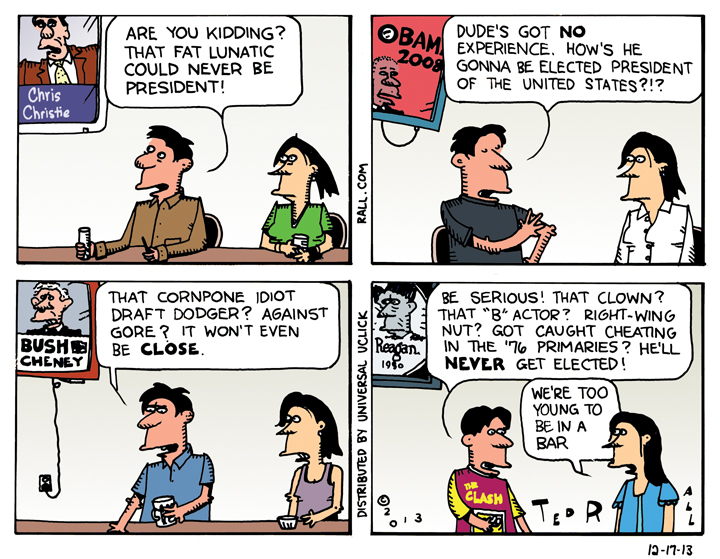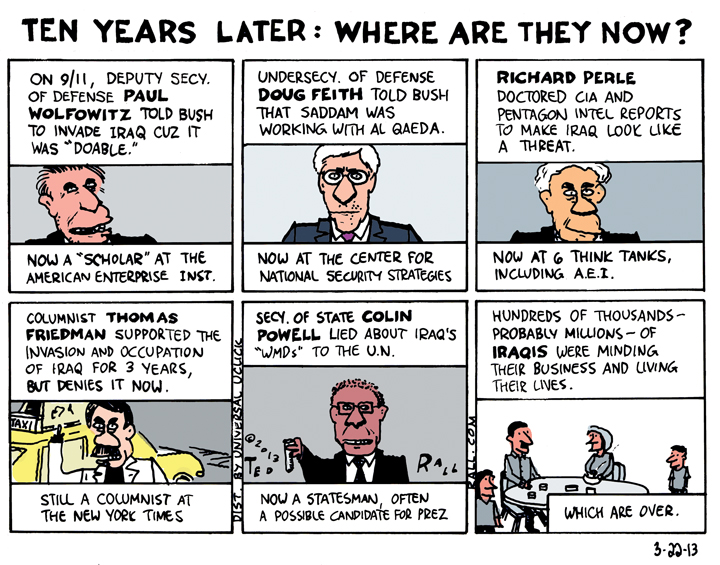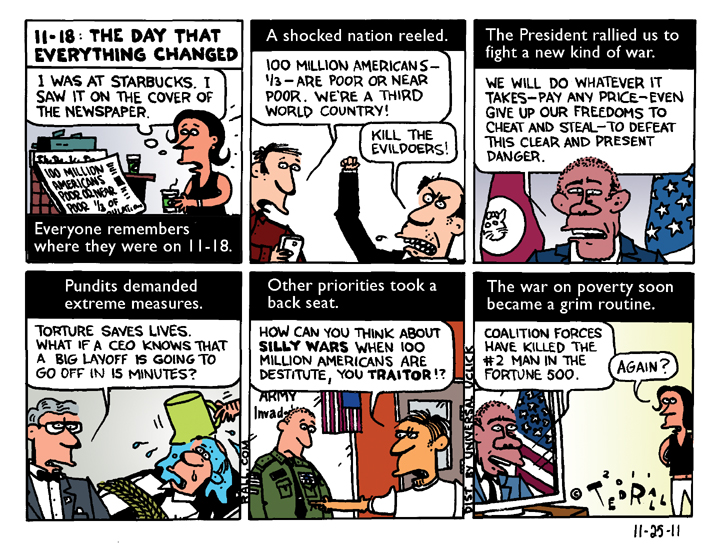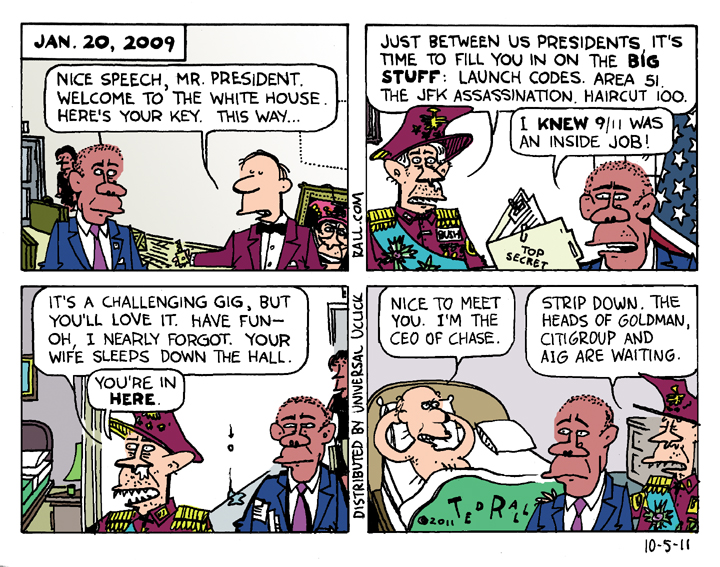
Every damn second of every stupid day in this brain-dead nation, the insipid overlords of America’s inane corporate news media put out the same message: extremism is extremely bad.
9/11? Carried out by Muslim extremists. The couple who murdered two police officers in Las Vegas this week? Right-wing, anti-government extremists. Washington gridlock? A Republican Party taken over by intransigent extremists (the Tea Party).
In this official narrative, unquestioned by left and right alike, moderation and centrism are equated with reasonableness. So Hillary Rodham Clinton describes herself as a middle-way realist who values compromise — i.e., a moderate and therefore a Very Serious Person, and thus qualified to be president.
To be feared and marginalized, by contrast, are those the system defines as “extremists.” (Some might call them men and women of principle. But that would be on funny little blogs no one reads.)
If you criticize the mainstream (the current government, the biggest corporations, the most well-connected journalistic elites) in a sustained way — especially if you call those in charge out for breaking their own rules and laws — you will be categorized as one of these horrible “extremists.”
A recent example: Michael Kinsley, lately of Slate and The New Republic (the most centrist of moderate magazines), comparing Glenn Greenwald to Robespierre (within the context of the pretty extreme French revolution, extreme) in the New York Times (down to the tone of any given sentence, the most centrist of moderate newspapers), for the sin of complaining about NSA spying, drone assassinations, Guantánamo and other (when you think about it, extreme) U.S. government activities that violate — U.S. government laws.
Though, actually, “violate” doesn’t quite go far enough. Bombing countries without bothering to declare war against them pees all over the Constitution, numerous federal laws — the whole spirit of the American endeavor. Extreme, no?
This is some bass-ackward shit.
For asking that political elites obey their own laws on domestic spying and not assassinating American citizens on American soil — even being willing to mount an actual filibuster over it — Rand Paul gets portrayed as a wacky fringe loony-toons extremist. For listening to our calls and reading our email and dropping Hellfire missiles on American citizens — and children! — without a warrant, Barack Obama is a moderate.
What the “moderates” call “mainstream” is, in truth, about as extreme as it gets.
Ex-Obama Treasury Secretary Timothy Geithner, formerly of Goldman Sachs and thus the embodiment of reasonable centristness, is pushing a book in which he claims a tough-call-but-had-to-do-it middle ground for an action that was in reality about as extreme as can be: his reaction to the 2008-09 economic collapse. Geithner gave $7.77 trillion in taxpayer money to the banks and their top executives, no questions asked, and $0.00 to the homeowners and unemployed people whom the banks screwed. (Also, there’s this: he failed. The economy is still tens of millions of unemployed behind; consumer confidence is still shit. NPR still asks his opinion.)
Speaking of books, Hillary’s latest brief, called “Hard Choices” — a phrase meant to conjure Solomonic wisdom — kinda sorta admits she “got it wrong” by voting for the U.S. war against Iraq.
Democrats voting for Republican-led wars — that’s the “crossing the aisle” “bipartisan” “seriousness” Manhattan and Beltway pundits like Thomas Friedman and David Ignatius, both of whom did the same, approve of.
Moderate.
The war, of course, was an extreme affair. Between $2 trillion and $6 trillion down the shitter. 4,500 dead American troops. Hundreds of thousands whose brains will never be right again. At least a million — more like two million — dead Iraqis. Who can count them all? A Second World oil state, secular socialist and authoritarian, reduced by ten years of American occupation to civil war and total societal, political and economic disintegration, Third World going on Fourth.
And what about the way it began? Ginned up out of whole cloth. Even by U.S. standards, it takes some big stones to justify attacking a nation that never attacked, or threatened to attack, you. Pretending that you know about WMDs, and then getting caught lying, and then not only not apologizing and immediately withdrawing, but doubling down (c.f., the “surge”)?
Pretty damn extreme, if you ask me. (No one does. Cuz, like, my saying so makes me extreme.)
Hillary’s “hard choice”? In 2003, Bush was popular, so was invading Iraq. She assumed that, when she ran for reelection to the Senate in 2006, Bush and his war would still be the bee’s knees.
Sorry, Iraq.
Hard choice, you see.
With “moderates” like this…
Yet the Moderate Class is so loud about the evils of extremism. Writing in the very moderate Washington Post opinion pages, a forum that promoted the Iraq War and publishes the full range of editorial opinion from center-right Democrat to center-right Republican, Paul Waldman asked “How much does right-wing rhetoric contribute to right-wing terrorism?” after the Vegas cop shooting.
Here’s a taste: “When you broadcast every day that the government of the world’s oldest democracy is a totalitarian beast bent on turning America into a prison of oppression and fear, when you glorify lawbreakers like Cliven Bundy, when you say that your opponents would literally destroy the country if they could, you can’t profess surprise when some people decide that violence is the only means of forestalling the disaster you have warned them about.”
Mmmaybe. But how about a little context? Assuming that “the fetishization of firearms and the constant warnings that government will soon be coming to take your guns” inspired the Vegas shooters, shooting cops isn’t good. But: (only) four people died, including the killers, in Vegas. Four dead due to right-wing extremism.
Millions died in the Iraq War. This slaughter wasn’t inspired by, but directly carried out by a bipartisan Congress coming together to support an attack editorial writers on both the Right and what passes for the Left agreed upon.
Why doesn’t anyone at the Post ask “How much does mainstream Democratic-Republican rhetoric contribute to U.S. state terrorism?” Here is how Waldman would write if he or his editors were sane:
“When you broadcast every day that an isolated Middle Eastern dictatorship is a totalitarian beast bent on reducing America to ashes and irradiated rubble, when you appease lawbreakers like Bush, Cheney, Rumsfeld and John Yoo, when you say that antiwar activists would literally destroy the country if they could, to score cheap political points, you can’t profess surprise when some people decide that war is the only means of forestalling the disaster you have warned them about.”
When you run an extremist government that markets itself as realistically moderate, your smartest move is distraction.
See Huge Crazy Extremist Kettle point at tiny extremist pot.
Like, even when a politician considered extremist within the bounds of the two-party “mainstream” gets defeated by an even more extreme extremist, mourn the loss of the slightly less extreme extremist as “A Bad Omen for Moderates.”
And ask things like this:
Why on earth would a 22-year-old from Florida with a “passion for Islam and teaching children about the Quran turn into something more disturbing”?
The New York Times approvingly quotes Veronica Monroy, a friend of a man who carried out a suicide bombing against Assad government forces in Syria: “He deplored any kind of negativity, and was always the first to lend a hand if you needed one. He was religious, but definitely not an extremist,” Monroy said. “He was loving and caring, and I know he came from a strong, loving, supportive home.”
Get the message? Jihad is extreme. Fundamentalists are severe and cold, not loving or caring — and they’re usually the damaged products of dysfunctional families. Extremism is “negative.” Follow a religion. Just don’t really follow all its tenets.
Like that stuff about giving up all your stuff and joining the poor: that would be extreme.
If you step back from the media maelstrom, it isn’t all that hard to frame another narrative: here was a young man, his father from Israeli-occupied Palestine, politicized by the global onslaught against and oppression of Islam, led by the U.S. Done with “doing typical adolescent things, such as playing video games,” he put his ass on the line and made the supreme sacrifice for his coreligionists.
Moner Mohammad Abusalha’s wasn’t my brand of “extremism.” Nevertheless, unlike Hillary’s vote to destroy Iraq, carefully calibrated to maximize her centrist warmongering cred as a “realist” “moderate,” it’s one I can respect.
(Ted Rall, Staff Cartoonist and Writer for Pando Daily, is the author of the upcoming “After We Kill You, We Will Welcome You Back As Honored Guests: Unembedded in Afghanistan.” Subscribe to Ted Rall at Beacon.)
COPYRIGHT 2014 TED RALL, DISTRIBUTED BY CREATORS.COM





